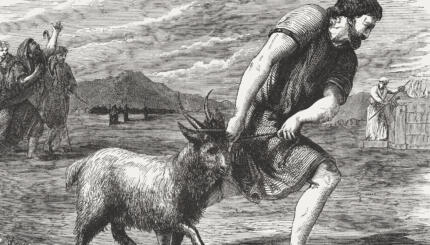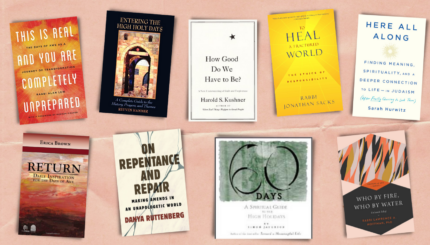As part of its theology, the Reform movement rejects the notion that the Temple will be rebuilt and sacrifices reinstated. This has lead Reform Judaism to alter certain holiday readings that specifically deal with sacrifices. Reform does not do the holiday Maftir (additional) readings because they specify sacrifices to be brought for the particular festival. The traditional morning portion is about sacrifices. The Reform Torah reading focuses on the freedom human beings have to make moral choices. The selection emphasizes that “we elevate life above a biological function into an ever-growing series of conscious choices to improve our lot and the lot of humanity.” (Gates of the Season, p. 157, Central Conference of American Rabbis.)
This English translation is reprinted with permission from Tanakh The Holy Scriptures published by the Jewish Publication Society.
29:9. You stand this day, all of you, before the LORD your God- your tribal heads, your elders and your officials, all the men of Israel,
29:10. your children, your wives, even the stranger within your camp, from woodchopper to waterdrawer-

Help us keep Jewish knowledge accessible to millions of people around the world.
Your donation to My Jewish Learning fuels endless journeys of Jewish discovery. With your help, My Jewish Learning can continue to provide nonstop opportunities for learning, connection and growth.
29:11. to enter into the covenant of the LORD your God, which the LORD your God is concluding with you this day, with its sanctions;
29:12. to the end that He may establish you this day as His people and be your God, as He promised you and as He swore to your fathers, Abraham, Isaac, and Jacob.
29:13. I make this covenant, with its sanctions, not with you alone,
29:14. but both with those who are standing here with us this day before the LORD our God and with those who are not with us here this day.
30:11. Surely, this Instruction which I enjoin upon you this day is not too baffling for you, nor is it beyond reach.
30:12. It is not the heavens, that you should say, "Who among us can go up to the heavens and get it for us and impart it to us, that we may observe it?"
30:13. Neither is it beyond the sea, that you should say, "Who among us can cross to the other side of the sea and get it for us and impart it to us, that we may observe it?"
30:14. No, the thing is very close to you, in your mouth and in your heart, to observe it.
30:15. See, I set before you this day life and prosperity, death and adversity.
30:16. For I command you this day, to love the LORD your God, to walk in His ways, and to keep His commandments, His laws, and His rules, that you may thrive and increase, and that the LORD your God may bless you in the land which you are about to enter and posses.
30:17. But if your heart turns away and you give no heed, and are lured into the worship and service of other gods,
30:18. I declare to you this day that you shall certainly perish; you shall not long endure on the soil which you are crossing the Jordan to enter and possess.
30:19. I call heaven and earth to witness against you this day: I have put before you life and death, blessing and curse. Choose life-if you and your offspring would live-
30:20. by loving the LORD your God, heeding His commands, and holding fast to Him. For thereby you shall have life and shall long endure upon the soil that the LORD your God swore to Abraham, Isaac, and Jacob to give to them.


